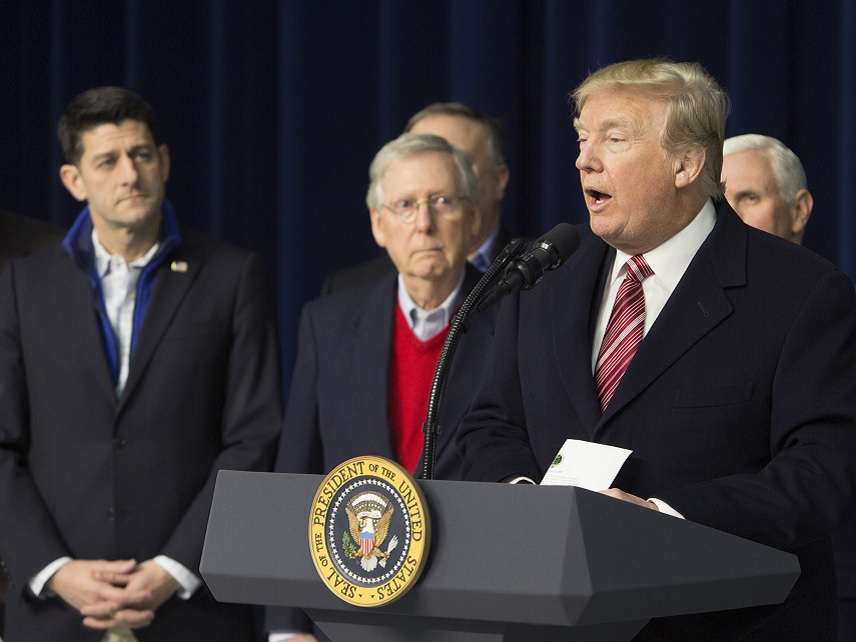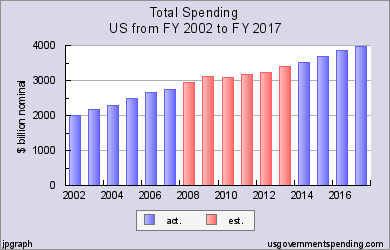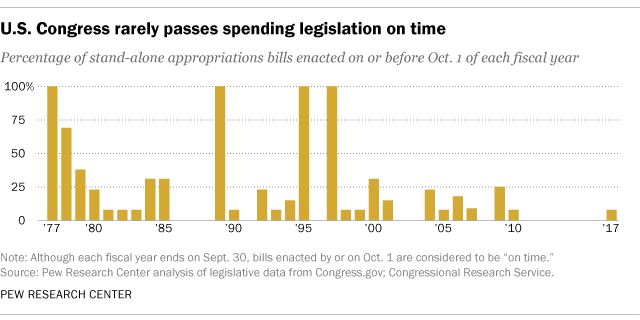GOP Leaders Tell Fiscal Hawks To Fly Away, No Budget This Year
Republican leaders spent most of the Obama years attacking rising debt and massive spending. Now that they control the budget, they could not care less.

There's no mystery why fewer and fewer of us trust the federal government. With every passing day, its leaders reveal themselves as so thoroughly political as to be unprincipled.
Remember former Senate Majority Leader Harry Reid's "full flop" on the question of needing a filibuster-proof majority to confirm judicial nominees? Or that golden moment right after the contested 2000 election where the Republicans suddenly championed federal sovereignty and the Democrats supported state's rights in attempts to win Bush v. Gore? You get the idea: The Dems and the GOP pretend to have principles but they abandon them the minute they sniff out a political opportunity. We're way past what political analyst Jonathan Rauch would call "honest graft," or legitimate "back-room deals" that allow the government to function. At least for the entire 21st century, we're in a landscape more scorched and nihilistic than a Mad Max movie.
The latest episode in all this is the Republican Congress punting on the idea of pretending to pass a budget resolution for the fiscal year than began on October 1, 2017 (almost five full months ago!). For any sort of spending cuts to happen this year, the House and the Senate must each pass a budget resolution. The two bodies could then hash out differences via a process called reconciliation, which would allow the Senate to bypass legislative filibusters requiring 60 votes and instead pass legislation with just 51 votes. You'll recall that this the process that was used to pass last year's tax cuts and that Speaker Paul Ryan and other Republican leaders promised that they would tackle spending cuts this spring. The latest from Politico paints a very different picture:
White House and Hill GOP leaders discussed the possibility of forgoing the painful budget process during last weekend's Camp David legislative summit, according to four sources familiar with the talks. Senate Majority Leader Mitch McConnell has argued that he cannot pass controversial deficit-reduction legislation using powerful budget procedures with his new 51-vote majority — and wasn't even sure he could find the votes for a fiscal blueprint in the first place.

Instead, expect increases of up to $200 billion over the next two years:
Congressional leaders are knee-deep in bipartisan spending negotiations that are shaping up to be a nightmare for [fiscal] conservatives, potentially raising federal spending by more than $200 billion over two years, with few — if any — ways to pay for it. In the same month, Congress also plans to send Trump an $80 billion-plus disaster relief package, the largest of its kind, with no offsets. And just this week, House Republicans announced a plan to debate a return of earmarks, which conservatives have called the "gateway drug" to spending.
We have, of course, seen this movie before. Republicans controlled the House, Senate, and White House under the first several years of George W. Bush and, despite the passage of tax cuts and oh-so-sincere promises to reduce spending, they absolutely kicked out the jams on outlays like nobody's business. The chart above and to the right shows total federal outlays in nominal dollars. If you believe that the real cost of government is what it spends, it's hard to argue that the GOP is in any way the party of small government. At best, they are the party of small-government rhetoric. And even there, don't get them started on issues such as immigration, gay marriage, and drug legalization.
None of this lets the Democrats off the hook, by the way. As Matt Welch refused to forget, Barack Obama campaigned on enacting "a net spending cut" in which "every dollar that I've proposed, I've proposed an additional cut so that it matches." When the Dems briefly won back control of the House, Speaker Nancy Pelosi declared that her party would cut spending. They didn't even try, of course, and who can blame him? When you get to funnel spending to your favored constituents, suddenly it's a real Sophie's choice to cut even the tiniest, most useless program. But just as our elected leaders have veered into open nihilism when it comes to principles, so too have they long been incapable of passing budgets in the very years that such bills are supposed to cover.
As Drew DeSilver at Pew writes,
Congress' chronic inability to follow its own appropriations process goes back decades. In fact, in the four decades since the current system for budgeting and spending tax dollars has been in effect, Congress has managed to pass all its required appropriations measures on time only four times: in fiscal 1977 (the first full fiscal year under the current system), 1989, 1995 and 1997.
This chart is truly disturbing if you expect your government to be run by something other than lazy graduate students who take three incompletes every semester:

Here's the worst of it all, per DeSilver's lucid, evenhanded, and completely damning explainer on how budgets are supposed to work: Less than one-third of federal spending is even governed by annual budgets these days.
So-called discretionary spending covers things such as defense and education, and amounted to just $1.2 trillion, or 30 percent of outlays, in fiscal 2017. Meanwhile, "mandatory spending"—which includes Medicaid, Medicare, and Social Security—and debt service makes up the rest of the federal nut. Such spending can't be turned off annually and chews up a growing share of outlays (at the start of the century, for instance, mandatory and discretionary spending each accounted for about half of the federal budget). For libertarians who trumpet Congress' absolute dysfunction as "gridlock," the reality is that the federal treasury continues to bleed out even if Congress does nothing. We need to hold our elected officials to a different standard than whatever we've been using. At the very least, they shouldn't get paid a red cent until they follow their own goddamn budget rules and take on-the-record votes of just how much money we don't have that they're willing to spend on stuff that nobody really wants.

Show Comments (36)